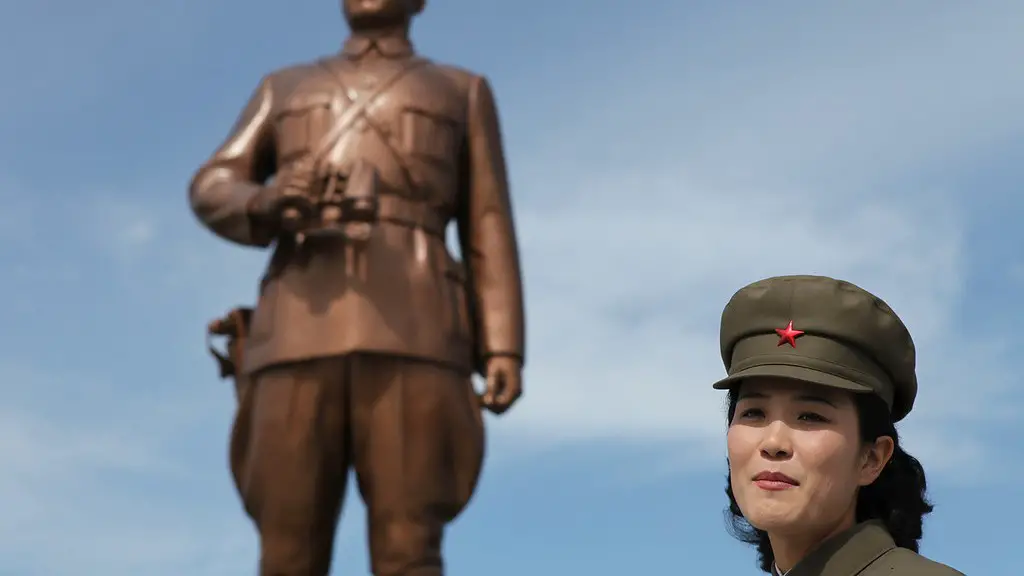The Origin of Communism in North Korea
North Korea has been a victim of communism for several decades. It was the Soviet Union’s backing in 1945 that first exposed the Korean peninsula to the ideology of communism. After the division of the Korean peninsula following the Japanese occupation of World War II, the Soviet-backed North Korean Worker’s Party set up in the north and the US-backed South Korean Democratic Party in the south. This initiated the Cold War between the two countries, when North and South Korea began to follow opposing ideologies. North Korea soon declared itself a communist nation.
The Korean War, which lasted from 1950 to 1953, saw the citizens of North Korea come under the control of communist leaders. After suffering mass casualties, starvation, and displacement, the people of North Korea were desperate for a regime that could restore stability. This need for stability served as the driving force behind Kim Il Sung, who had been backed by Moscow, to become the leader of the North Korean Workers’ Party, as well as the country itself. He rapidly unfolded his own form of communism in the country, influencing the lifestyle and culture of North Korea.
The Impact of Communism on North Korea
Communist rule in North Korea has been highly detrimental to the people of the country. The ruling communist regime puts the enforcement of ideology ahead of the wellbeing of its citizens, manifesting in an oppressive dictatorship that restricts all causes of self-expression or creativity. This oppressive nature of the leadership has caused immense suffering and hardship in North Korea, with aggressive censorship and a lack of access to basic amenities that citizens in other developed countries enjoy, including food, shelter, freedom of speech, and the right to education.
The North Korean government strictly confines its citizens within their own borders and the right to exit is strictly confined to a select few. For most North Koreans, movement in and out of the country is highly restricted. North Koreans also suffer from a lack of political representation as there has not been a functioning parliament in the country since the 1970s. The few elected officials who remain have limited legislative power, as the decisions are ultimately made by the government.
The Role of Communism in North Korea’s Economy
Communism has played an instrumental role in the stagnation of North Korea’s economic development. Centralized control of the economy by the government has resulted in limited economic activity, with the state controlling most of the capital, production, and distribution. This has resulted in an inefficient economy, with the majority of resources being diverted towards the state and its armed forces, leaving the people of North Korea with very few opportunities to advance economically.
Furthermore, North Korea’s economy is heavily reliant on international aid, with the distribution of aid failing to result in economic progress. This has led to a dependency on international aid and weakens North Korea’s self-sustainability. In addition, international sanctions on North Korea have further damaged the economy, making recovery extremely difficult.
The Perpetuation of Communism in North Korea
Despite the enormous amount of suffering and lack of economic development faced by the North Korean people under communist rule, the ideology remains firmly entrenched in the country. This is attributed to the tight grip the North Korean government has on the nation. All sources of media, including television and radio, are state-controlled and censored, making it impossible for citizens to be exposed to alternative perspectives outside of the government’s agenda.
The state has also curtailed overt criticism of it, through numerous oppressive measures that range from the threat of imprisonment to death. This has resulted in a climate of fear within North Korea, leaving citizens unable to speak out against their oppressive leaders. As a result, the people of North Korea are unable to challenge the ideology of communism and are unable to resist the oppressive and backward policies of the state.
The Human Rights Violations Under communism in North Korea
Communism has resulted in serious human rights violations in North Korea. The government is known for its abuse of power, with its citizens routinely being subjected to forced labour and torture. Human trafficking, lack of freedom of assembly, restriction of citizens’ right to fair and free election, lack of free education and access to information, and enforced ideological conformity are just some of the violations of basic human rights in North Korea.
The government has constructed an extensive network of prison camps, known as kwanliso, which are used to house and suppress political dissidents. Approximately 120,000 people are believed to be housed in these camps, where they suffer from inhumane treatment and a lack of basic amenities. Those who are imprisoned are often subjected to torture, starvation, forced labour, and even public executions, highlighting the severity of human rights abuses under communism in North Korea.
U.S. Sanctions on North Korea
Since the 1950s, the U.S. has imposed sanctions on North Korea, which have grown in intensity over the years. The sanctions were intended to prevent the North Korean government from accessing the international market, and to restrict the access to foreign capital and resources. The sanctions have had a significant negative impact on North Korea, by limiting the flow of goods and resources, weakening its domestic markets, and reducing its capacity to conduct business on the international stage. In addition, the sanctions have further exacerbated poverty levels in the country, making any chance of economic development severely difficult.
The recent U.S. sanctions, which have become more aggressive under the current administration, are intended to target large financial institutions and business entities that have ties to the North Korean government and military. The sanctions aim to target major sources of foreign currency, in an attempt to pressure the government in abandoning its nuclear arsenal, as well as its oppressive policies, including the enforcement of communism.
The Future of Communism in North Korea
Despite the U.S. sanctions and general sentiment of hostility towards the North Korean government, there appears to be little chance of the communist system of governance ending in North Korea in the near future. This is due to the deeply entrenched nature of the regime, as well as the continued backing of powerful nations like China that support it.
In the past, North Korea has proven resilient to threats from foreign powers and it is likely to remain this way, due to its ability to sustain itself without the need for foreign aid. This coupled with the heavily oppressive nature of the regime and the enforcement of censorship, means that any chance of abolishing communism in North Korea and allowing for democratic reforms is highly unlikely.
International Pressure on North Korea to Lower Tensions
The international community has expressed continued concern over North Korea’s aggressive nuclear ambitions, with many countries adopting a hard line stance towards the country in response to its refusal to abandon its nuclear weapons program. International organisations like the United Nations have appealed to North Korea to commit to peace and work towards stability in the region.
In recent years, there have been numerous stalled negotiations between North Korea, the US, and South Korea, aimed at denuclearization. This increased international pressure on the government in Pyongyang has resulted in a reduction of tensions on the Korean peninsula, making progress on cooperative relations between North and South Korea possible.
Efforts to Humanize North Koreans
The people of North Korea have long been victims of their leaders’ oppressive policies. To better understand the people’s suffering, international organisations have been actively trying to provide aid to North Koreans through advocacy, humanitarian assistance, and communication bridging.
The international community has called for the reformation of human rights inside North Korea, with the acknowledgement of existing violations and to stop further abuses from occurring in the future. The international community has also pushed for diplomacy and dialogue to replace the hostile rhetoric that has been common in negotiations with North Korea.
The Morality of Communism in North Korea
Many argue that communism is morally unjust when used to oppress and control people as is witnessed in North Korea. Communism is fundamentally opposed to personal freedom and is inherently authoritarian, which is why it is often compared to fascism. Communism is often perceived as a tool of oppression, a means to control the people by a tyrannical state, as evidenced in North Korea. Marxism, which is the foundation of communism, deems that all members of society should have equal rights and should be treated equally, yet in North Korea, this is not the case.
Despite the current oppressive nature of North Korea’s communist system, some argue that the ideology could still be beneficial to the people of the nation in the future, if the oppressive policies and restrictions were replaced with progressive and compassionate principles. This would require the shift away from the existing oppressive government rule, in favour of a more open and democratic system of governance.
The Impact of Global Norms on Communism in North Korea
The global norms have had an influence on the gradual change in the perception between North Korea and the rest of the world. The United Nations has urged North Korea to adhere to international conventions and respect for human rights. This has resulted in some marginal changes with regards to the treatment of citizens within the country. For example, the United Nations has raised its awareness to the plight of the North Korean people and the need to provide them with a well-grounded human rights structure.
Furthermore, international organisations are actively campaigning to end the oppressive government rule in the country, in favour of a more open and democratic system of governance. This is intended to ensure that North Korea abides by the global standards of human rights and can move in a direction that promotes the wellbeing of its citizens.


